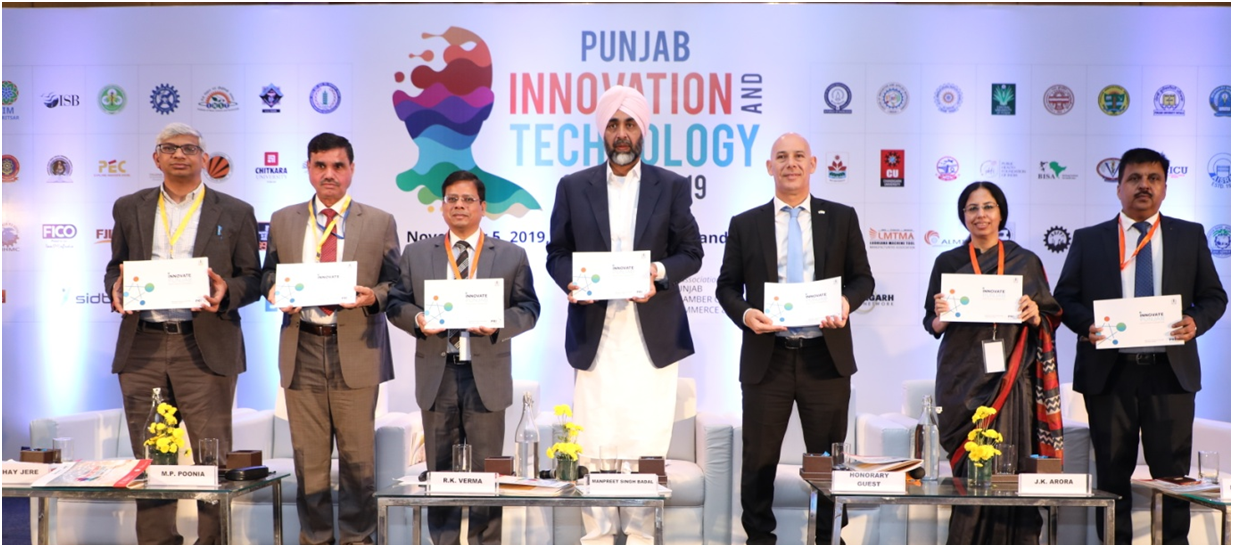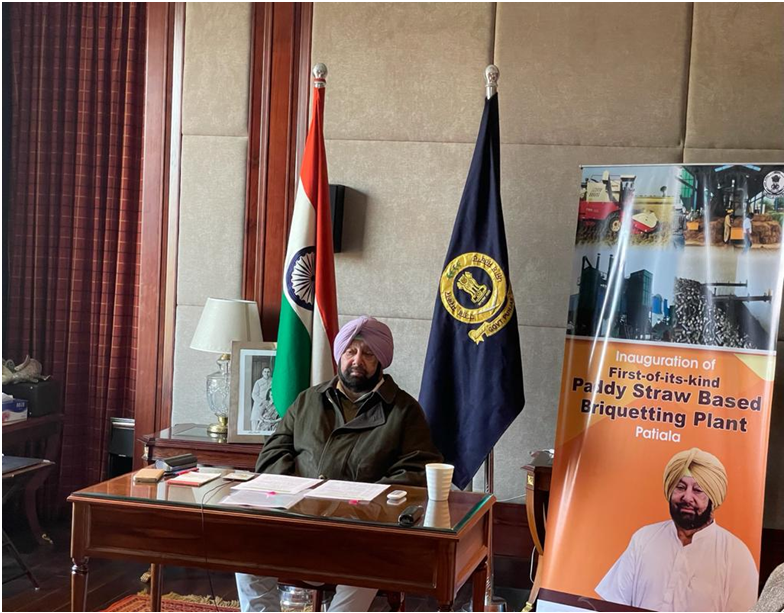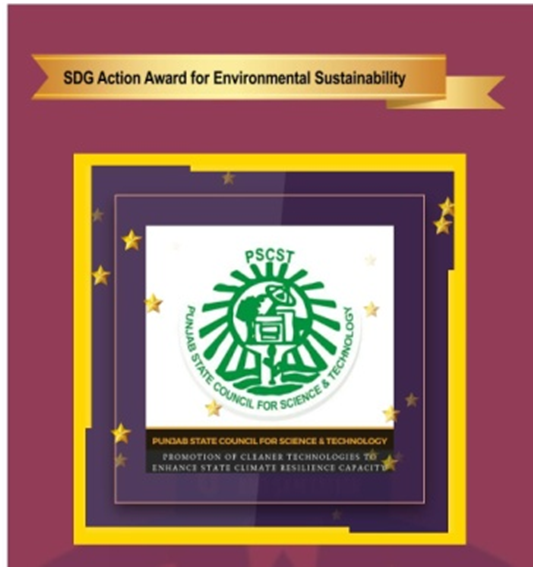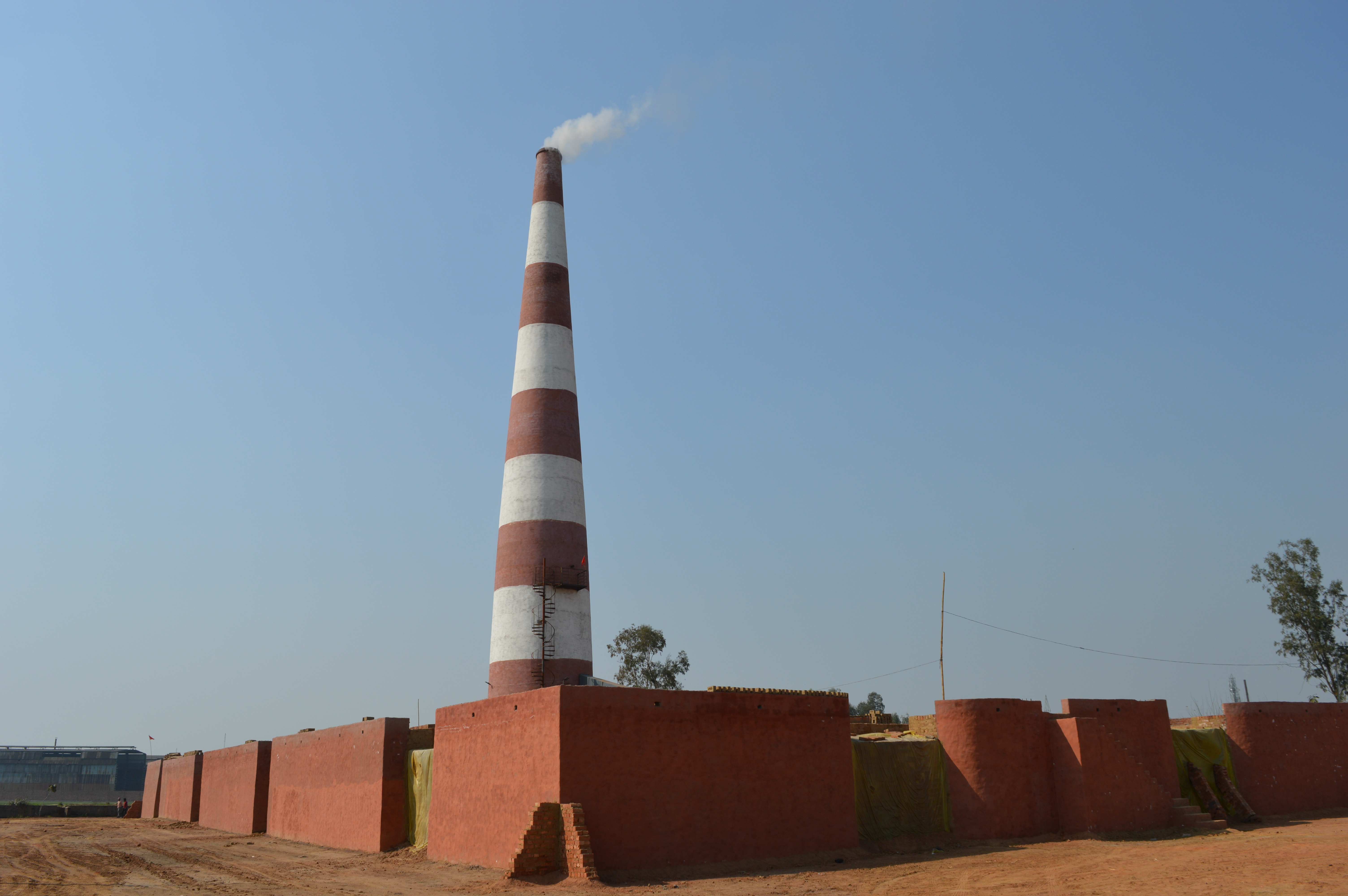Date: 2019-11-05
.png)

.png)
The State of Punjab Known for its leadership role in the Country is geared up to make Punjab a Hub of Research and Innovation. Thus State has launched ‘Mission Innovate Punjab’ to build an Innovation Ecosystem to drive Knowledge Economy by consolidating and synergizing the endeavors of Key stakeholders viz. Research Institutions, Universities, Administrative Departments, Incubators, Industry and Tech-led Start-ups. The Mission is being steered by PSCST under the aegis of Department of Science Technology & Environment Punjab. The major objectives of Mission Innovate Punjab (MIP) are to enhance competitiveness, boost growth, create quality employment & achieve sustainable development goals. Under the MIP, 18 MoU has been signed with the Research& Academic institutionsand Industrial Associations to boost the Research & Innovation ecosystem in the State.

PSCST has set up Country’s First-of-its-kind paddy straw briquetting plant of 100 ton per day capacity at village Kulburchan, District Patiala in collaboration with Private Partner M/s Punjab Renewable Energy Systems Pvt. Ltd. It has been inaugurated virtually by Hon’ble Chief Minister, Punjab on 18.12.2020 for promoting gainful utilization of paddy straw in the State.
SDG Action Awards for ‘Environment Sustainability’ of UNDP and Govt. of Punjab are conferred on organizations and individuals who have contributed towards sustainable development in the State with exemplary initiatives that have led to significant impact. PSCST received this award on 28th September, 2020 for promoting cleaner technologies to enhance State’s Resilience Capacity.

Date: 2018-07-15
Forced Circulation Solar Dryer Technology (FCSD) has been demonstrated by Punjab State Council for Science and Technology in collaboration with School of Renewable Energy Engineering, Punjab Agricultural University in lower Shivalik foothills of Punjab. The technology due to evacuated tube collectors and forced circulation drying offers distinct advantage in terms of achieving higher temperature of 50-60° rapidly within 1 hour and its prolonged maintenance compared to conventional solar drying, which is based on simple green house effect. Two FCSDs have been set up jointly with local Self Help Groups of village Fatehpur and Dharampur, Hoshiarpur, District with the support of Department of Science and Technology, Govt. of India. The Units have facilitated local women to dry local resources viz. Bhera (Terminalia belerica), wild mango (Mangifera sp.), Amla (Emblica officinalis), Giloye (Tinospora cordifolia), Jyotishmati (Celestrus paniculatis), Jamun (Syngium sp.), Shivlingi (Bryonopsis lacinosa), Bael (Angela sp.) etc. for enhanced income generation, which otherwise were being dried using conventional open sun drying. The open sun drying although more economic process, but has associated problems like uneven moisture content causing fungal infestation in finished products, damage due to rain, insects, dirt contamination due to long exposure in open and rendering the product poor in quality, hence fetching poor price. FCSDs usage has led to production of quality and hygienic products, free from dust & pests with enhanced shelf life. Based on success of these units, Govt. of Punjab has replicated technology at ten more places in the state.
.png)
.png)
.png)
.png)
.png)
.png)

.png)
More than 11000 brick kilns are operating in north India producing 50-55 billion bricks per annum. Coal is the main fuel used for firing of bricks in Bull’s Trench Kiln, operated by semi-skilled workers with little knowledge on good practices for efficient feeding and firing. As a result, long plume of black smoke is visible from the chimneys of the kilns containing particulate emissions in the range of 550-1500 mg/Nm3. These brick kilns operate at a low thermal efficiency of 20-30%. Further, in anticipation of the upcoming new brick emission standards, PSCST developed and demonstrated a novel energy efficient hybrid brick kiln with zig-zag firing technology at a brick kiln in Punjab with financial support of DST, GoI. The salient features of the technology are improved brick setting, longer firing zone resulting in better combustion of fuel, introduction of simpler operating system of flues, etc. This environmental friendly technology has led to reduction in fuel consumption by 15-20% as well as CO2 generation by 200 tons per operating season/kiln. The black smoke from kiln chimney has vanished and the emissions are well within the upcoming new emission standards of 250 mg/Nm3. The yield of first quality bricks has also increased by 10-15%. The payback period has been assessed as less than 2.5 years. This technology has the potential for its replication in the existing brick kiln through the process of retrofitting in the existing Bull’s Trench Kilns across the country. Punjab Pollution Control Board has approved this technology for its replication in the State. A number of kiln owners visited the demonstration unit during its operation in the last season. More than 300 brick kilns from Punjab, Haryana, Uttarakhand and J&K have already engaged the Council for providing technical consultancy for this technology. The Council has filed patent for this novel technology through TIFAC.